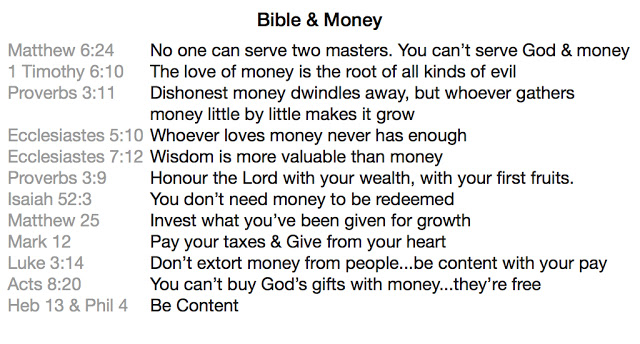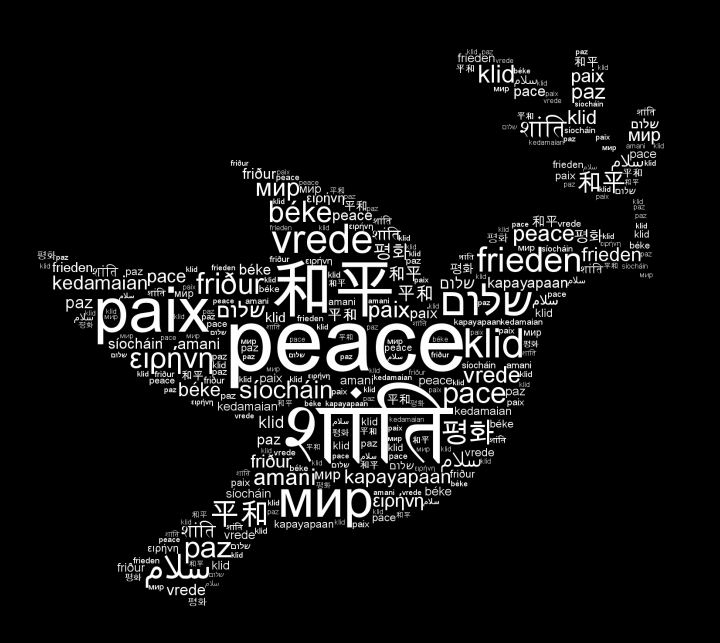
by Jonathan Manafo | Feb 16, 2016 | Sunday Conversations
Do you like getting questions about ideals and dreams? You know those kind of questions…the ones about where your ideal vacation spot would be, or where you think the most perfect place to live might be, or what kind of person fits your criteria for the perfect spouse. We have fun asking/answering those questions because most of time they’re long shots (except the spouse question, because if you’re married, he or she is already perfect right?).
What would you say if I told you that God’s preferred state for you and the human race is that we live in and experience PEACE (*shalom)?
If you were to ask our neighbours moving here from Syria what they desire most, it’s Peace.
If you were to ask a wealthy family with strife what they want most, it’s Peace.
If you ask a mom with energetic kids what she desires most, it’s Peace.
I think we’d all agree that if we want to live a SIMPLIFIED life PEACE is something we must be moving towards.
The Scripture has so much to say about peace. A few examples are…
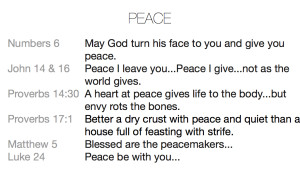 Why do so many people lack peace in their lives? Two reasons: it’s not an easy place to get to, and there are many obstacles that get in our way.
Why do so many people lack peace in their lives? Two reasons: it’s not an easy place to get to, and there are many obstacles that get in our way.
No matter who we are, we will experience Peace Busters in our lives.
1) Bad News
– that letter, text, phone call, email, that changes everything and turns our peace into turmoil
2) Moral Failure
– the thing we do that crosses a line and moves us far away from who we are or who we want to be
3) Impending Mortality
– illness or age gets us thinking about the number of years we may or may not have left
As valid as these peace busters are, none of them rob us of peace more than FEAR.
There is constructive fear and there is of course destructive fear. Constructive fear is what helps you perform better (nerves) or what drives you to do your best or prepare well for an exam. Constructive fear also stops us from doing stupid things. You can probably look back to your childhood and recognize moments when you wish you used a healthy dose of fear.
Destructive fear is the kind of fear that immobilizes – that stops us from moving forward into God’s way for our lives – the kind of fear that robs us of peace. It’s that kind of fear that God wants us to conquer and move past so that we can experience his kind of peace in our lives.
A few ways to help us get from Fear to Peace are…
Understand where fear comes from
Was there an event, a person, or a circumstance in your past that is causing fear in your life today? Take public speaking for example, the most common fear that people have; they say this fear is often caused by an incident in our childhood, one we may or may not even remember.
Anxiety is often triggered by recent events that raise our stress level. We may be coming out of stressful or unique season in our life that causes anxiety in the forthcoming season.
Expose fear’s lie
Many fears are based on ‘what-ifs’ – we catastrophize situations and think of the worst case scenario. We can’t allow our fear to thrive on deceit.
Face fear head on
One writer on this topic said that avoidance only causes escalation. Instead, reach out for God’s hand and go through it together with him. In other words, lean in and walk through/past your fear. 2 Corinthians 10:5 says, ‘take every thought captive and make it obedient to Christ.’ There’s no use running away, instead we must face it, learn from it, and move forward.
Speak truth to the lie of fear
Finally, we must combat fear with truth. This happens with three kinds of speech: self-talk, scripture-talk, and prayer. Self-talk involves positive words we tell ourselves. Scripture talk is allowing God’s words to fill our hearts and minds. Prayer is the privilege we have as followers of Jesus to talk to God about anything.
Don’t let fear become an obstacle to experience God’s peace in your life. Instead invite God’s peace to move you closer to the SIMPLIFIED life you are longing for.
Let these 3 final scriptures inspire and challenge you towards God’s peace in your life…
Philippians 4:6-7
Do not be anxious about anything, but in every situation, by prayer and petition, with thanksgiving, present your requests to God. 7 And the peace of God, which transcends all understanding, will guard your hearts and your minds in Christ Jesus.
1 Peter 5:6-7
6 Humble yourselves, therefore, under God’s mighty hand, that he may lift you up in due time. 7 Cast all your anxiety on him because he cares for you.
Ephesians 2:14
He (Jesus) himself is our Peace…
– – – – – – – – – – – – – – – – – – – – – – – – – – – – – – – – –
small(er) group discussion:
What is your definition of Peace?
What do SIMPLICITY and PEACE have in common?
The two verses from Proverbs are both amazing metaphors and very practical. How so?
Which Peace Buster hits home the most? Why?
How real is Fear in your life and experience and in the experience of your loved ones?
Do you think the steps towards Peace in today’s post are helpful? If so, why? If not, why not?
Spend the last few minutes talking about Philippians 4:6-7. Address things like anxiety, prayer, peace beyond understanding, and guarded hearts.
When you pray tonight, think of those in our world who live in turmoil. Pray for them and other unpeaceful situations that weigh heavy on your heart.
(Along with other requests you may have tonight.)
* Shalom is the Old Testament word for Peace. It’s meaning is deeper than just how I’m feeling inside. Shalom is God’s desire for people’s physical and spiritual state, as well as the state of creation. The story of Scripture leads to God’s restoration of all things so that the earth can live in Shalom/Peace.
by Jonathan Manafo | Jan 26, 2016 | Sunday Conversations
Would you say that money makes you happy? The appropriate response is NO.
However, would you say that a little more money would make you a little happier? It’s fair to say YES.

Funny enough, our happiness is not connected to our bank accounts. Not at a global level at least. Most of the ‘wealthy’ countries in the world are at the lower end of the ‘happiness’ scale. (USA is an example) Where as some of the countries that are at the bottom end of wealth and prosperity are in the top ten of those who are happy. (Guatemala is an example of this). C.S. Lewis said,
“Don’t let your happiness depend on something that you can lose”Money is a funny thing. We need it to live, to travel, to eat, to get educated – many of the good things in life. However, we’ve seen money cause some nasty things in peoples lives, especially when it’s given too much value or prominence.
In Matthew 6 Jesus says, “You cannot serve both God and money.” Jesus is onto something here. Why? Because as good a tool as money is, it makes a really horrible god. Money wasn’t meant to be longed for or worshiped or coveted, it’s simply meant to be a resource to fund and fuel the lives that we are called to and choose to live.
“Money is a wonderful tool, but it makes a horrible god.”
Matthew 6 isn’t the only place the Bible talks about money. There are more than 1000 references to money, currency or related issues. If you’re wondering why, it’s because the bible is a book about people and community and relationships, and wouldn’t you know it, money is always in the middle of those things. The other reason is that money is tied to our values. If you’re not sure what’s important to you, check out your bank statement or credit card bill, those two things are a pretty accurate reflection of what’s important to us.
In the future we’ll spend a few weeks (posts) on a more thorough look at how our faith changes our perspective on money and resources. For this post, let’s just look at 5 beliefs that will lead to financial reconciliation or peace.
1. All we have comes from God.
This is the best place to start. Things often begin getting out of sorts with money when we forget who our provider is. I’ve said before that no matter what name is on your paycheck, hidden underneath there somewhere it says, ‘God gave this to me’.
Starting here adds two very important ingredients to our lives, humility and perspective. We can never get too arrogant about how much we have if we know that God is the provider. Wisdom says, “I didn’t get here on my own”. Faith says, “God had something to do with it.” Starting here will change the rest of the conversation on money.
2. I live joyfully within God’s current provision for my life.
In other words, Be Content (Heb 13, Phil 4).
It’s our human nature to wish for more. It’s our human nature to want what we don’t have. Think about how many times you’ve asked yourself what you would do if you won the lottery? I don’t even play the lottery and I ask myself that question. The Bare Naked Ladies asked this question in their classic song, “If I had a million dollars”.
Here is where we can get in trouble with debt. Bill Hybels says, “Debt comes from wanting more than God’s current level of provision for you life and arranging other ways to get it.”
Simplifying our lives includes living within our means; being content with what God has provided in each season of life we are living.
3. I want to honour God by giving my first fruits for his purposes in the world.
This might be the toughest thing to talk about when we discuss finances. Tithing, giving away 10% of your income, is an interesting shift for someone that’s not used to it. However, it can be the most freeing way to live if we fully trust God.
When you start with the first belief (above), this third one kind of comes naturally. The two main places in scripture we see this is
Malachi 3:10 and
Proverbs 3:9. The problem with these verses is that we view them as (OT) law, when really they are simply a biblical principal to practice. When we view this as law we’re making it religious and discounting the New Testament and Jesus. Jesus came to fulfill the law, to move us away from the law and lead us to a new way of love. What do you think inspires more generosity, law or love?
The reasons you’d consider instilling this principal into your budget are…
– You trust God with your finances and believe that everything you have comes from him
– You love the local church and believe it’s the hope of the world
– You identify that giving towards causes that are outside of yourself is actually a healthy way to live
– You fully believe that giving a portion of your income is the best way for you to make things less about you. The more we give the more self-less we become.
This belief takes the most faith, but also reaps the most rewards. And the coolest part is, once you start giving that much away, your desire to give more actually increases.
4. I will set aside a portion of my income (10%) for savings, emergencies, later years, etc.
If giving reinforces that it’s not all about ‘us’, then saving, in the same way, reminds us that it’s not all about ‘now’.
Winter is coming. It always arrives. Sooner or later, something breaks down, somebody gets sick, a car stops working, a career doesn’t go as planned. You get the idea. If we only live in the present and don’t plan for the future, we will enter the difficult seasons of life unprepared.
Here’s the equation that has proven to work best for many wise people:
10 – 10 – 80
10% towards giving
10% towards saving
80% towards living
If your income grows you can always up the first two percentages. On the other hand, the last percentage should never increase, only decrease. Make sense?
5. Live each day, open to hear God’s whisper in your life about opportunities to bless others and make a difference.
Everything we’ve talked about up to this point can lead to the most amazing way to experience God in our lives. If we give, save, and then live on the rest, God can and will do wonderful things in and through us. Being responsible with our income will give us opportunity to bless others. Living simply will enable us to bless extravagantly. Who doesn’t want to experience that kind of joy and freedom with our finances?
Hope this was helpful. Feel free to engage the comment section of this blog if you have any questions.
Money, like time, is in scarce supply, once you spend it it’s gone, so use it well.
– – – – – – – – – – – – – – – – – – – – – – – – – – – – – – –
small(er) group discussion:
Why is it difficult to talk about money? Especially in or within the church?
How have we convinced ourselves that money actually makes us happy?
Out of all the verses listed above, which one speaks to you or challenges you the most?
– How can money become a god in someone’s life?
Be honest with this one, what’s the toughest thing about tithing? Disregarding how some “christians” (especially those on TV) have ruined our view of giving, why is tithing a good principal?
– Share why it’s difficult or why it’s a beautiful thing. No judgement!
Is ‘saving’ as God-honouring as ‘giving’? If so, why?
Have you have ever been on the giving or receiving end of Belief #5? Perhaps you were blessed by someone listening to God…or…you listened to God and blessed someone?
Close tonight be praying for open hands, large hearts, wise minds and clean balance sheets. And anything else you’d like to pray for!!!
– – – – – – – – – – – – – – – – – – – – – – – – – – – – – – –
Bonus Coverage
A few tips on saving…
– If you have a work retirement, great, but don’t count (only) on that and government CPP for future years
– Don’t throw extra money in an RRSP if you don’t have to. Use up TSFA limits so that when the time comes to use this money, the government won’t tax you on it. RRSP’s are great if they help lower your taxes, but if you’re in a lower bracket, you might not really need those savings now and will be thankful later that you saved them in a non-registered account.
– Use any method you can to save: monthly contributions, change jars, bank the rest programs, etc.
– Use reward cards to your benefit: Starbucks, Canadian Tire, PC points, etc. Don’t spend more to get points, but if you are going to use these stores at least let them work in your favour a little.
– If you make some extra money with overtime or a surprise side job, don’t just blow the money, decide how to best use it (e.g. put 1/2 of it on your mortgage or car loan or in a savings account)
– of course, budget for everything
– tell your money where to go, don’t let it boss you around
* please note that we borrowed the above 5 beliefs titles from Bill Hybels.

by Jonathan Manafo | Jan 20, 2016 | Sunday Conversations
Some might say that our life is made up of squares – lots of them. We fill them in with appointments and work and events. Some of us fill up every square and others of us try and leave as many of them as possible empty.
 When talking about simplifying our life, we can’t really get too far into the conversation before mentioning our calendars and schedules. Our lives move forward (time wise) with every passing minute, hour, day and week. We can plan those minutes well or let them slide by into the past, never to be used again.
When talking about simplifying our life, we can’t really get too far into the conversation before mentioning our calendars and schedules. Our lives move forward (time wise) with every passing minute, hour, day and week. We can plan those minutes well or let them slide by into the past, never to be used again.
We are so busy!!! At least that’s what we tell ourselves and others. Isn’t funny when we’re asked how we’re doing, the most common answer is, ‘I’m so busy’. It’s almost like we’re bragging. You hardly ever hear someone say, ‘life is great, I’m really finding my rhythm, I’m experiencing a good balance between home and work and play, can’t really complain.’ What a boring answer right? One writer says when we respond without thought with ‘I’m busy’ that it feeds something unhealthy in us.
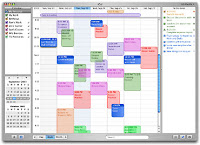
There are two approaches to time, we either use our calendar to help us steward our time or we let other things and people control how we use (and lose) our time. What if we saw our calendar as the primary tool to help us become who we want to be; more importantly, who God wants us to become.
In Ephesians 5, Paul says these words about time and opportunity, “Be careful then, how you live, as wise and not unwise, making the most of every opportunity.” What’s he getting at? Be thoughtful how you invest your time, your days, your lives. In light of this verse, we can ask one simple (or not so simple) question, ‘What if God were in charge?’ Bill Hybels says, ‘the thoughtful arrangement of your daily and weekly calendar is one of the holiest endeavors you can undertake.’ and ‘our schedule is far less about what we want to get done, and more about who we want to become.’
Let’s be honest, our schedules are very connected to our character and personality. We approach things by the way we’re wired. Some of us are morning people, some night people, some of us need naps, others not much sleep. Historical figures are great examples of this. Many of them worked within strange schedules, but it worked for them. One thing is for sure, our calendars need to match up with our values; with who we want to become. Jesus was the best example of this. Gordon MacDonald puts it so well; he says Jesus’ schedule was dictated by three things:
1) he understood his mission (Luke 19:10)
2) he understood his own limits (Mark 1:35)
3) he took time to invest in others
Time, like money, must be budgeted.
It’s in scarce supply and
must be used wisely.
Ask yourself this, what will it take or what does my schedule have to look like to be…
– a better friend
– a better spouse
– a better parent
– a good neighbour
– an awesome employee
– a better follower of Jesus
In order for us to become who God wants us to be we have to consider a few things in regards to our schedule.
Get the important stuff in first.
We’ve all heard the metaphor about the Mason Jar, the one about getting the big rocks in before you add the small rocks and pebbles. As old and worn out as that illustration is, it’s still very true. If we don’t plan to pray or to read or to spend time with family or to get the education we need, it may never get into our overwhelming schedule.
Fill the squares with words that reflect your plan and your purpose.
John Grisham, before he was known for his novels, was a lawyer. John had a dream to be a writer, so he included the word ‘WRITE’ in the hour square just before his work day started. He would go into work an hour early to write. He stuck to this schedule, and wouldn’t you know it, he became one of the most popular novelists of the late 90’s and 2000’s.
What words need to get into your calendar so they become sacred to you? READ, PRAY, FAMILY, HOME, RUN, DATE NIGHT, etc?
Make room to hear God’s whisper in your life.
Both Bill Hybels and Tony Campolo start their day with prayer. Hybels describes it as rolling out of bed and onto his knees. Campolo says he simply lays in bed for the first 20 minutes and prays. Are you making room for this in your life? If you want to know God more and desire that your life looks more like the life of Jesus, I’d suggest you make time for prayer and scripture. No other way to say it.
If you want to be intentional about your calendar being a tool to help you become who God wants you to be, here’s a final suggestion of what you should consider as non-negotiables to fill some of the squares in your life:
1 – make time to connect with God
–
church, a few minutes a day of reading and
prayer, small group, …
2 – make time with your Family
–
date night, play night, movie night, vacation, …
3 – make time to do good work
–
a plan to get better, to get ahead, to network
more, etc…
4 – make time for Recreation
– a plan to get better,
5 – make time to Exercise, sleep well & eat well
“Be careful then, how you live, as wise and not unwise, making the most of every opportunity.”
– – – – – – – – – – – – – – – – – – – – – – – – – – – – –
small(er) group discussion:
When you think of your calendar what words come to mind?
When you’re asked how you are doing, do you find yourself often responding with, “I’m busy” or a similar phrase? Why? How does it make you feel?
Take time to read Ephesians 5:15. Does this challenge you in any way? If so, how?
What are some squares in your life that need rearranging? Which ones may have too much value? Which ones may have too little value?
Do you have prayer or reflection or scripture slotted out on your schedule? Why is it tough for some people to be committed to a few minutes a day?
Pray about being intentional with your time. If certain people in the group share about ways they want to simplify or grow in their time management, pray for that tonight. And pray that we would make time to become who God wants us to be.
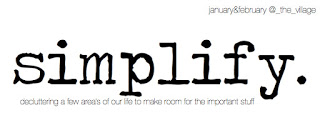
by Jonathan Manafo | Jan 14, 2016 | Sunday Conversations
During my teenage years my mom would regularly ask me to clean and declutter the garage; by regularly I mean every six months. She wouldn’t ask my brother, or my sister, or my dad, only me. Let me tell you, our garage needed decluttering. It was a mess on good days. It would get so bad that you couldn’t walk through it without feeling like you were in an obstacle course. I’ve come to realize there are two kinds of people, those with perfectly clean garages and those with very messy garages. You’d figure with all the practice I had that I’d be in the first group, but nope, my garage gets messy – really messy. However, when I clean it, it transforms in a spotless space, and my mom would still be very proud.
 I’m sure you don’t have too look to deeply inside your heart and life to see and admit that our lives get as cluttered and crowded as some garages do. We let so many things into our life that things can’t help but get chaotic.
I’m sure you don’t have too look to deeply inside your heart and life to see and admit that our lives get as cluttered and crowded as some garages do. We let so many things into our life that things can’t help but get chaotic.
How many people do you know use words like this to describe how they’re feeling? Exhausted, tired, overwhelmed, over-scheduled, anxious, etc. This describes the rich, the poor, men, women, liberals and conservatives. It doesn’t matter who you are, things in your world get crazy. At some point we have to take stock at how things are going and make some decisions to simplify our lives.
Simplicity is a way of life, a calling, a certain way to
balance all that life throws at us, by stewarding our time, our thoughts, our
money, our gifts, our skills, our calendar, our emotions, our everything.
What if we could end each and everyday with gratitude for how we invested our day? Knowing that in each and every moment we chose what was best.
Simplifying takes work – it’s rigorous and hard, but worth every bit of the pain and discipline.
For those of us who are discovering what it means to follow Jesus, the purpose of simplification comes down to one thing, hearing the whisper of God in our lives.
In Luke 10 we read a very short, but powerful story about Jesus and his disciples finding themselves at the home of two women, Martha and Mary. Martha, as would have been first century custom, was preparing some food in the kitchen, Mary on the other hand made her way to the other room with Jesus. Martha comes over and gets mad at Mary…and Jesus. She actually asks Jesus if he cares – that’s quite the accusation for a man who would eventually sacrifice his life for the whole world, Martha included. She’s mad at Mary for not helping her with the food. Jesus, with kindness and wisdom, responds to Martha with these words, “a few things are needed…indeed, only one…”
Martha wasn’t sinning by making food. Martha wasn’t doing even doing something wrong. Martha did what she thought she should be doing. Jesus simply wanted to help Martha capture the moment. You see, in that very moment, the best use of her time was not cooking, the best use of her time would’e been to join Jesus and listen to his words (of life). Mary, at least in this moment, got it. Not only did get it, but she broke a cultural boundary in the process. Mary stepped out of the ‘place/space for women’ (the kitchen) and walked into the living area (where the men gathered)*. Think about the cultural significance of this choice – it was quite risky and gutsy. Martha didn’t know what do with it. Jesus takes this moment to affirm Mary’s choice. (these and other things often got Jesus in trouble…good kind of trouble)
Jesus wants to help us simplify things. He invites us to choose well in every moment; to unclutter what’s gotten in the way of us truly living so we are able to hear and listen to his voice.
For the next 7 posts (Sunday’s) we will look at how we can simplify the most important things in our life: finances, schedules, relationships and decisions. However, lets get to the most important part of this conversation first – Jesus asks us, like he does to Martha, to get this first decision right, to choose him. We will always be faced with decisions to choose well in every moment. This happens with our families, with our work, and with our health. Those are all important things. But to get those things right, you gotta get this first thing right – choose Jesus.
Is it hard to make time for this? Yes. Does it take some effort to put aside time to read scripture, pray, and gather with community? Yes. Was it extremely difficult for Mary to cross a social barrier to be with and learn from Jesus? Oh yes it was. Is it all worth it? For sure.
Simplifying is about choosing the right things in your life. Jesus is the first and most ‘right’ thing for any of us. Choose well.
* In the first century, there were only two places women and men were together socially, in the yard with their children or in the bedroom with each other. In every other setting, men and woman remained separate. In Luke 10, Martha was where she thought she should be. Mary, on the other hand, went into the room where only men gathered. You can imagine how this looked, what it stirred, and how risky it all was. But Jesus, among the many things he was known for, was well known for being willing to break down barriers. Mary must have felt quite the stirring in her heart to take the kind of step she did. Unfortunately, we still see some of these inconsistencies in human rights today. I’m so glad that Jesus calls us to break away from those misconception and live in full harmony with one another.

by Jonathan Manafo | Dec 31, 2015 | Sunday Conversations
It’s the last day of the year. This day creeps up on us…oh…every year. It never fails. We are given one day to look back before we cross over to what is a New Year. Does it really matter? Can we be defined by a day on the calendar? Should we even stop to reflect or are we allowed to simply let the day pass without thought or care?
I think days like this are important. We should take advantage of each moment that forces us to reflect on what was, and look ahead to what will be (or what can be). For some it’s birthdays, for others it’s the new school year, for some it’s spring time, but for everyone it’s December 31. New Year’s Eve is your last chance to look back with the purpose of looking forward, because before you know it, somebody at Toronto’s City Hall or New York’s Time Square is screaming ‘HAPPY NEW YEAR’ and at that moment the line has been crossed, and ready or not a New Year has arrived.
Here’s the question – what are you looking forward to? Have you thought about it? Are you sad to see 2015 gone or are you desperately waiting for something new? Our reflections can’t all be the same, but what is the same is the line we cross on days like this. Something else can and should be similar – our expectation to see and experience what God may have for us this coming year. May our pray be the same, that God would do a new thing in us and a new thing through us.
May these words from Isaiah ring true for us…This is what the Lord says – he who made a way through the see, a path through the mighty waters, “Forget the former things; do not dwell on the past. See, I am doing a new thing! Now it springs up; do you not perceive it? I am making a anew way in the wilderness and streams in the wasteland.” (Isaiah 43:16,18,19)
Whatever this year may hold for you, may God be in the middle of it. Whatever may be on the horizon, may you sense God’s presence in a fresh and deep way. Whatever circumstance, may God move us forward from where we were to where we ought to be. May we be light in dark places and peace in tough spaces. May we show grace and love to our world. May God’s blessing be so evident in how we live.
“The Lord bless you and keep you;
the Lord make his face shine on you and be gracious to you;
the Lord turn his face toward you and give you peace.” (Numbers 6:24-26)
Happy New Year
The Village
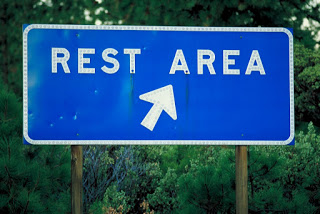
by Jonathan Manafo | Nov 16, 2015 | Sunday Conversations
Almost every tool we use needs some kind of rest. We shut them off, we recharge them, we reboot them. The need is real when you wake up in the morning and realize that you didn’t recharge your phone – it’s not a pretty sight is it. The funny thing is that we are quick to recharge batteries and phones and computers, but we don’t always shut ourselves off. Some recent surveys suggest that there is more self-imposed overtime these days than ever before. We are busy and we don’t care, because if we’re honest, it makes us feel better about ourselves. Busy is our standard answer to the common question, ‘How are you doing these days?’. However, as Eugene Peterson says, “Business is maybe the most vocation-destroying condition that there is.” How do we find a balance between working hard and resting well? How can we appreciate the work we are called to do while not neglecting our bodies and our minds?
Seems like God had a great idea when he created Sabbath. When we started this series we said that God was our first and best example of work. Interestingly, God is also our first and best example of rest. In the beginning…there was REST. Genesis 2:2-3 says that God, after working for six days, blessed the seventh day and made it holy. God called all the other days good, but this day of rest he called holy. God stops. God creates a finish line. God punches out and says, I’m done, for now. He didn’t do it for himself, because he was tired, he did it for us, to show us that stopping is just a important as working. In other places like Exodus 16 and 20 and 31 we are reminded how important this was to God and to his people, Israel.

Shabat means to stop, to cease, to desist. God’s invitation to participate in Sabbath was an invitation to stop what we are doing, stop working, stop producing, and to be reminded of the things that are important, mainly, Him, his covenant, and the people he’s placed in our lives to do life with (family, friends, community). This became for Israel both a practical way to live, while also being their philosophical identity – who they were in comparison to other nations. In Deuteronomy 5 we see that Sabbath was also a reminder that Israel were no longer living like slaves in Egypt. Sabbath was a weekly reminder that they didn’t have to go at it 24/7 any more; no one was forcing them to work all day, every day. God’s people would be different, they could stop producing and begin trusting…in God.
As much as Sabbath was intended for people, God also intended it for land and agriculture. You can read about this in Leviticus 25 & Deuteronomy 15. Israel is told to work the land for six years and let it rest on the seventh. Not only would they trust God to have enough, they’re also encouraged to give to those in need from their abundance. Sabbath had much to do with justice and generosity as it did with replenishing vessels, either human or earthly.

When we jump to the New Testament we find Jesus pushing back from religious leaders who want to force him to be strict about the Sabbath. Jesus, being a good Jew and Rabbi of course observed the Sabbath, but he wanted his followers to know that the Sabbath was there to serve them/us, not the other way around. What would be the use of being enslaved to a law that is meant to remind people that they don’t have to live in slavery any longer. In light of that, we can feel good about discovering some kind of Sabbath in our lives, without the religiosity or legalistic approach that some faith people attach to it.
So…in 2015, how can we appreciate and invite a principle that was instilled and created so many centuries ago? Great question. First know this, Sabbath is about people stopping long enough to be reminded about what is important to them in life. Those things should be Jesus, family, friends, community, etc. A few things to think about…
Sabbath is about Rhythm
Having a healthy rhythm to your life is so important. God’s idea of Sabbath leads us down that path. Feeling good about working hard while taking the right time to stop is the best way to live in balance. What kind of things add to our healthy Rhythm? Prayer, Scripture, Gathering in Community, Loving your neighbour, Working Hard, Playing Hard, Enjoying Family & Friends.
Sabbath is about Trusting God
By putting a stop to production we are reminded of something that is so important: We are not God. God provides for us. Sure we work hard and earn a pay check, but God is the one behind it all. Working without resting messes with our heads and gets us thinking that the world revolves around us. It doesn’t. It revolves around God. Rest/Sabbath actually makes God bigger in our eyes. Abraham Heschel writes, “The world has our hands for six days, but our souls belong to someone els”.
Sabbath is a Gift
Sabbath isn’t a reward for finishing on time or doing a good job; it’s an intermission in the middle of an ongoing game. Sabbath is like a boss who shows up with coffee and says, “Break Time”. Time is not a possession we own but a gift we are given to use and steward. It’s like money, it’s not ours to hoard, but ours to use wisely.
Sabbath is an Investment
Unlike sleep that forces itself on us, Sabbath has to be invited and welcomed. It’s not about a day it’s about an attitude. Start small: Pray a few minutes a day, not for stuff or requests, but simply to enjoy God and be thankful for what you have – Sit down for dinner without any distractions and simply enjoy your family – Enjoy the church community you’re a part of; when you gather, connect deeply – Find leisure activities that fill you up. Sabbath isn’t just about church, it’s about life; it’s an investment into your faith, your family, your community, yourself.
Before closing this post, pause to read these few texts. Breathe in and breath out and rest in God.
Be Still and Know that I am God (Psalm 46)
My soul finds rest in You (Psalm 62)
Come to me, you who are tired, and I will give you rest (Matthew 11:28)
– – – – – – – – – – – – – – – – – – – – – – – – – – – – –
small(er) group discussion
What resonated with you in this post/talk? What was difficult for you to digest?
Do you see Sabbath as an important principal that is too hard to follow or an old law that is outdated and unpractical?
Why do you think God called the 7th day holy? What’s holy about about rest? What’s holy about reflection? (Genesis 2:2-3)
Deuteronomy 5:15 says “Remember that you were slaves in Egypt and that you were brought out of there with a mighty hand and an outstretched arm. Therefore the Lord your God has commanded you to observe the Sabbath day.” Do you ever feel like you’re a prisoner of your job? What does this say about deliverance and being enslaved to your job or work?
What advice would you offer your small group as helpful ways to instil ‘sabbath’ moments into your life? How does one see Sabbath as Jesus did, a gift to serve us, not a law to be rigorous about?
What would you say about these two quotes on busyness?
“Busyness is maybe the most vocation-destroying thing there is”
“Busyness makes us stop caring about the things we care about.”
Some kind of Sabbath in our lives is healthy if we see it as a way to instil…
Healthy Rhythm/Balance
Trust in God
Seeing time as a Gift
Ways to invest in Faith, Family & Community

 Why do so many people lack peace in their lives? Two reasons: it’s not an easy place to get to, and there are many obstacles that get in our way.
Why do so many people lack peace in their lives? Two reasons: it’s not an easy place to get to, and there are many obstacles that get in our way.

